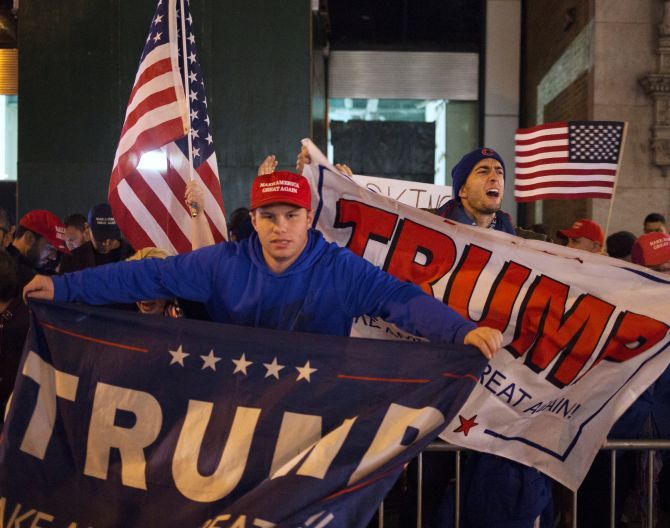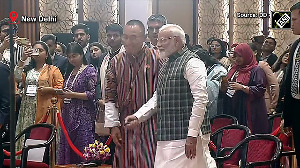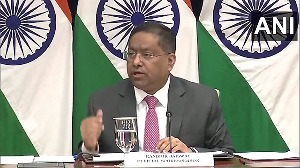'A bit of marketing, a bit of positioning, and a lot of strategic thinking is required, and all this should be in aid of India's strategic intent: Becoming the third pole in a global G3 and aiming for Numero Uno,' says Rajeev Srinivasan.

It was on November 9, 1989, The Economist informs us, that the Berlin Wall fell.
Equally momentous is November 9, 2016, with Donald Trump's unexpectedly large victory. In the context of the former, India was a bit player. But now, India is a serious power, and Trump would be well advised to pay attention to India.
On the other hand, Indians need to also dump their tendency to pontificate or be seduced by flattery, and look at the relationship with cold calculation based on India's long-term interests. I was glad when Rediff asked me to write on this, because I am a little concerned about babus losing the plot.
All rhetoric aside, Donald Trump is an 'America-first' believer. Therefore, one has to assume that he will keep the US' long-term interests in mind.
Going one step further, an India that is in sync with said long-term interests will get the maximum traction and mindshare. Thus, India needs to focus on areas where we share common interests: That would be the logical conclusion.
What are Trump's hot-button issues? Here are some that are evident to me and a few that were suggested by the Financial Times, in some order of perceived priority:
- Economy and Trade
- Foreign Policy
- National Security, Terrorism and Defence
- Infrastructure
- Healthcare
- Tax Policy
- The US Supreme Court
- Climate Change
- Immigration
Economy and Trade: Trump is looking to 'bring back the jobs' and to ensure a decent GDP growth rate. Some likely consequences India should be prepared for:
There will be pressure on the Indian generic pharma industry as part of the push by Big Pharma to improve margins. Indian IPR rules such as Section 3(d) which prevents 'evergreening' of expired patents on inconsequential 'innovations' will be under renewed attack.
There will be opportunities to pursue bilateral trade agreements with the US based on Trump's likely downplaying of both NAFTA as well as TIPP and TPP.
However, there will also be pressure to accept TRIPS+ provisions that help protect US MNCs.
Trump may or may not move ahead with his threatened 45% punitive tariff on, say, China. That will have ramifications for India as well in terms of trade disputes.
It is possible that Trump will remove the Super 301 straitjacket under which India has laboured, in an effort to push India into reducing the trade deficit. This may entail a lifting of sanctions on aerospace and defence related items as well.
Foreign Policy: Trump has indicated that he will pursue a more robust foreign policy against rogue States, while at the same time becoming somewhat isolationist and thinking in terms of 'Fortress America.'
Obama's unsuccessful 'Pivot to Asia' will be rethought.
Of interest to India: Trump has already encouraged Japan and South Korea to develop their own defences including nuclear weapons. Given the threat from China and proxy North Korea, it is possible that a formerly pacifist Japan will forswear its Article 9 and emerge again as a military power.
This will be good for India as Japan is its best and most dependable partner in Asia.
Rethinking NATO: Trump may unilaterally reduce or even revoke some of the US' commitments to defending European allies, or at the very least charging them for the US defence umbrella, and especially downplaying its 'special relationship' with the UK.
This opens up a vacuum for India to play the Indian Ocean card.
The retreat from Europe should also lead to a reduction in hostilities with Russia, as the Obama-Clinton-Kerry mischief of pointlessly irritating Russia with misadventures such as in Georgia and Ukraine will be reversed.
China will be in the cross-hairs, and Trump is likely to attempt to 'contain' China using a grand strategy of alliances with Japan, Australia, India and Vietnam among others. The failure of the 'Pivot' (see how TTP is going nowhere, and see recent moves by the Philippines and Malaysia to appease China) should encourage him to create a real partnership with India, as China continues to rampage in the South China Sea.
Trump is likely to ramp down the Iran nuclear deal; however, in regards to both Afghanistan and the Chinese takeover of Pakistan (aka the China Pakistan Economic Corridor), India's good relations with Iran may help it be a go-between for the US.
On Pakistan, Trump may be far more willing to cooperate with India in the raising of Balochistan as a human rights issue, and to actively dissuade the ISI from further mischief in India using proxies.
India will have to position Balochistan as an issue that hurts American interests and helps Chinese interests.
National Security, Terrorism and Defence: Barring stray incidents of lone wolf terrorism, the US has not seen much terrorist violence as its geographical isolation and fairly effective security mechanisms post 9/11 have saved it from major problems.
India has a limited role in these concerns, except to stress that almost all the terrorism in the US and the rest of the world emanates from, or has strong connections, to Pakistan.
A possible retreat from Afghanistan by the US will see them keen on bringing Indian troops into the war effort there, which may be a good thing for India to resist.
A possible retreat from the Middle East (as Trump realises that the US does not need Arab oil any more, thanks to shale oil and gas) will create problems for India, and again the US will try to induce India to step in to the vacuum: Resist!
Infrastructure and Healthcare: Trump has promised to end expensive foreign wars and bring back the trillions thus saved into rebuilding the physical and human infrastructure and capabilities. India may not have much of a role in this.
Similarly the problems of Obamacare and skyrocketing health costs suggest that there will not be much for India except in exporting generic drugs and nurses.
Tax Policy and the US Supreme Court: High tax rates in the US (around 35%) are encouraging MNCs to park their money abroad and to do tax-inversion acquisitions. Trump is expected to pack the court with conservative judges. India has no role to play in either.
Climate change: Trump's instinct is to deny global warming. Thus the momentum towards the (anyway toothless) Paris Agreements will be reduced. This is a net good for India so that it is not browbeaten into unnecessary restrictions (on coal-based thermal power plants) based on fashionable left-wing causes.
On the other hand, India is one of the nations most vulnerable to global warming and sea-level rises, so it may need to act on its own to push for renewables, especially solar photo-voltaics.
Immigration: Much of what was said by Trump regarding Mexican and Muslim immigrants during the campaign was pure rhetoric.
The fact of the matter is that if the US needs certain immigrants, it will accept them, even if they are Martians with three heads. Thus, skilled Indians should find it not very difficult to immigrate to the US.
This issue is a red herring so far as India is concerned, although racism is definitely an issue and is on the upswing: You need scapegoats when times are tough, and immigrants (especially nonwhites) are always convenient innocents to be sacrificed.
The visible movement of Indians to the US through the IT services route will be resisted. Trump may make it more difficult and expensive to get H1-B type visas. IT services will need to hire more natives, or do more work offshore.
India has a difficult task: Find out where its interests and America's coincide or converge, and emphasise them. This must be done by simultaneously keeping India's long-term best interests in mind.
A bit of marketing, a bit of positioning, and a lot of strategic thinking is required, and all this should be in aid of India's strategic intent: Becoming the third pole in a global G3 and aiming for Numero Uno.
Photograph: Alex Wroblewski/Reuters











 © 2025
© 2025